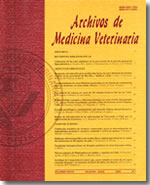Effect of selenium supplementation on blood glutathione peroxidase (GSH-Px) activity and weight gain in heifers
Main Article Content
Abstract
An experiment was designed to study the effects of a selenium (Se) supplementation with sodium selenite on the blood activity of glutathione peroxidase (GSH-Px; EC 1.11.1.9) and live weight gain of selenium deficient grazing dairy heifers from two dairy farms from the south of Chile.
A total of 80 Friesian heifers (40 growing heifers, 287 kg b:w; and 40 mating heifers, 358 kg b:w) managed at grazing on permanent pastures belonging to two selenium deficient herds (40 animals from each herd), were used. Animals were allotted in similar groups, treated and control. The animals from the treated groups were administered with sodium selenite at 1.67% i.m., in a single dose of 5 mg of Se/100 kg body weight. Body weight change and GSH-Px blood activity were determined previous to supplementation and every three months.
The initial blood activity of GSH-Px was 34 U/g Hb in one herd and 116 U/g Hb in the other (Ref. value = > 130 U/g Hb). A significant increase in the GSH-Px activity up to 3 months after supplementation with selenium (P<0.05) was observed and the highest values were found at the 2nd month of the experiment. The percentage of increase of GSH-Px at the second month in the treated animals, in comparison with both the initial values and the values of the control animals, was of 300% in one herd and 179% in the other herd.
The live weight gain up the third month was slightly greater in the treated group than in the control (P<0.05) with a mean of 234 and 220 g/d in the growing and mating treated heifers, respectively in comparison with 169 and 148 g/d in the control groups.
It was concluded that, under the conditions of this study, selenium supplementation increases the blood activity of the enzyme GSH-Px for a period of at least three months and there is also evidence suggesting an increase in weight gain in selenium deficient grazing dairy heifers.

